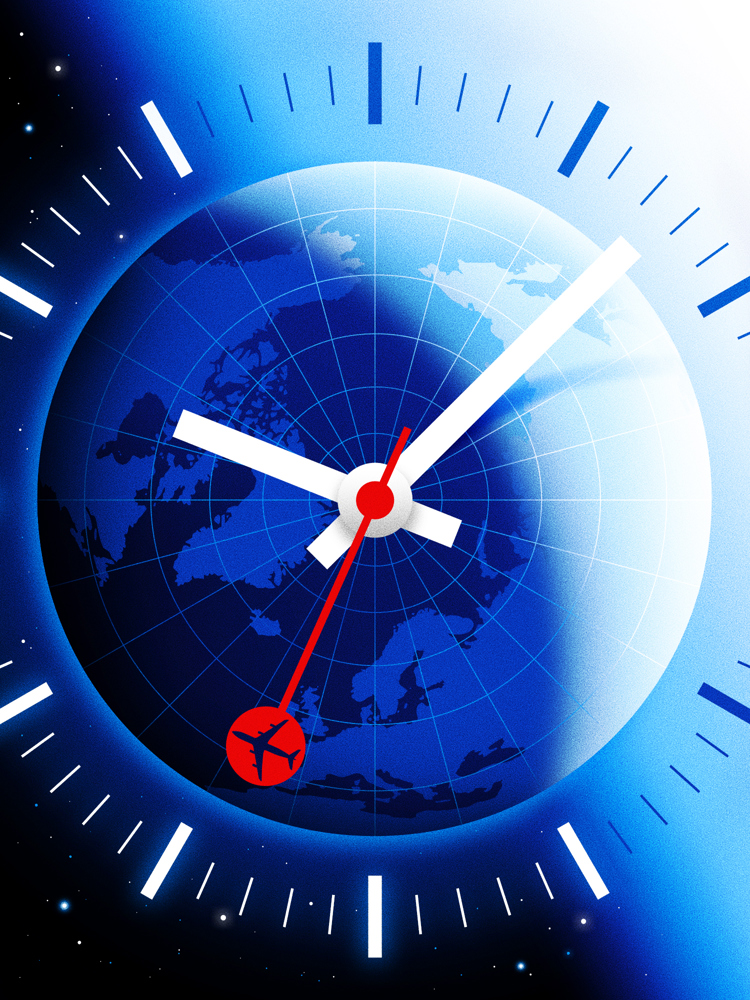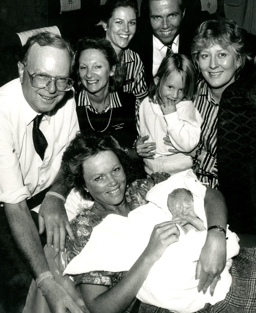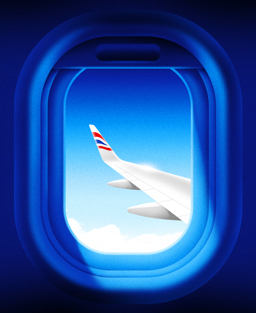

How do pilots combat jet lag?
Ever wondered how pilots fight off jet lag while crossing time zones for a living? From strategic naps to sunlight hacks, British Airways Senior First Officer Al Smith shares how he stays sharp at 35,000 feet
18/07/2025
Illustration: La Boca
We all know what it’s like to feel tired – but jet lag? That’s a whole different beast. It’s not just about being sleepy – it’s your body clock being completely out of sync. So, how do pilots, who cross time zones for a living, manage to function? And do we spend our entire careers jet-lagged? The truth is that there’s no one-size-fits-all answer. Most pilots develop their own routines and coping strategies over time.
I’m here to share some of them here – and answer some of the most common questions people have about jet lag. Before we go any further, it’s worth pointing out the obvious: I’m a pilot – not a medical expert – and any advice I share is based purely on personal experience!

How do you plan your sleep?
After years on short haul, I had a rhythm – early starts or late finishes, never both. But long haul is a different game. These days, I spend at least one night a week wide awake under the stars – but that doesn’t mean I have to lose a night’s sleep. I plan ahead: sleep before departure, nap after landing and squeeze in a siesta when I can. The key? Prioritising rest and making time for it, no matter what time zone I’m in.
Which direction is better for jet lag – east or west?
Personally, I find jet lag harder to combat when travelling eastbound. Depending on the length of my stay, I may try to adjust to the local time. However, if I’m only staying for 24-48 hours, I usually stick to UK time. If I were to land in Japan in the morning, I’d insist on going to bed for a maximum of three hours before getting up and doing something leisurely. Three hours seems to be the magic number – any longer and I won’t be able to sleep at the ‘normal’ bedtime. I always think a gentle walk – nothing strenuous – is a good way to adjust. I’ve heard some experts say that when travelling west to east, for every time zone crossed it takes a day for the body to recover. By contrast, they believe it takes a day for every one-and-a-half time zones crossed when going east to west.
Do you ever suffer from insomnia?
There have been occasions where oversleeping on what we call ‘landing day’ – a sacred day that should be free of tasks – has led to bouts of insomnia. It’s taken me years of flying to figure out that if I check the clock twice and it’s still within the same hour, it’s time to get up, have a warm drink (obviously not caffeinated) and watch a bit of TV. Otherwise, I spend the entire night tossing and turning.

Does food affect your sleep?
I once read that in order to adjust to the local time, you should adapt your eating habits to reflect your destination as soon as possible. I try to do that where I can. On a daylight outbound flight, I delay eating, so a) so I don’t end up eating too much, and b) my body can adjust to the time zone I’m heading to. If it’s a night flight, I try not to eat at all. People often look horrified when I say, “I’m not eating tonight” – but I feel so much better when I don’t. My body should be asleep – it isn’t expecting food!
Do you believe in sleep hygiene?
Absolutely. Every time we’ve moved house, my first priority has been: “How do I make my new bedroom feel like the best hotel room ever?” I prefer total darkness when I sleep – I highly recommend plantation shutters with a blackout screen. Zero light is incredible and allows me to sleep both day and night. Temperature is also vital. I think I have a two-degree tolerance before I’m either too hot or too cold. Yes, it’s the UK – but it reached 40°C in the last few years. Air-conditioning is the way forward! And quality bedding is another must. The White Company Egyptian cotton is my current favourite.
All this may sound like a lot, but it’s money well-spent in my opinion – and it makes coming home feel like checking into Claridge’s. Heaven on earth!

What are your ten tops tips for combatting jet lag?
1. If the hotel curtains don’t close properly, grab a coat hanger with trouser clips and clip the curtains together. It’s a lifesaver for daytime sleeping.
2. Limit alcohol.
3. Don’t sleep for more than three hours on landing day. If it’s after 3pm, try to stay up and just go to bed early.
4. If you’re a tea lover like me and nothing else will do, invest in quality decaf tea. It’s perfect for enjoying at any time of day or night.
5. Strategic napping is essential – just don’t do it on a subway in Tokyo (I learned this one the hard way!)…
6. Turn your phone to dark mode and switch on ‘Sleep’ or ‘Do Not Disturb’ at bedtimes.
7. Don’t go shopping just to kill time on landing day – you will only buy things you don’t need. Early in my career, I woke up to find I’d cleared out the entire miniature toiletries section of Walgreens after landing in Seattle.
8. Don’t oversleep while recovering from jet lag – in my experience, it prolongs my adjustment time.
9. Get outside and do some light exercise. Sunlight is a natural reset for me and is essential when it comes to acclimatising.
10. If you’re trying to stay up, never sit on the bed! Trust me – before you know it, you’ll be on your back and spark out. You’ve been warned!
Got an aviation question you’d like to ask pilot Al? Email theclub@cedarcom.co.uk and we’ll try to answer it in a future column





